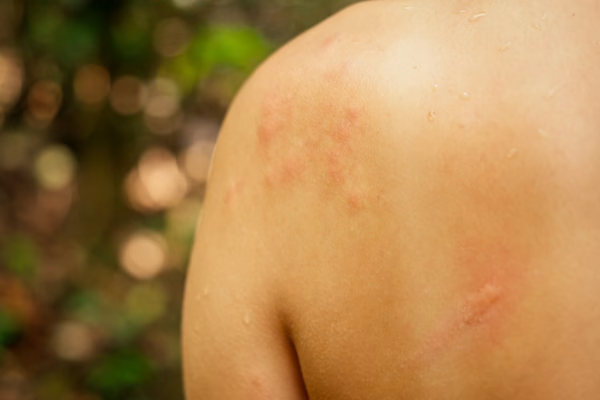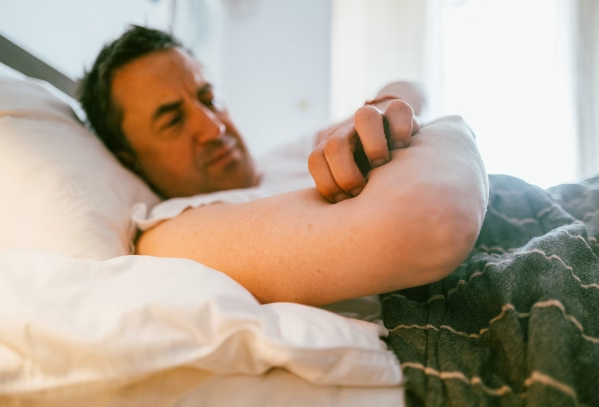There’s nothing like enjoying a meal outside on a balmy summer evening… until you start to feel mosquitoes biting around your ankles and other exposed skin. At nib, we consider ourselves your health partner, helping you work and play safely while enjoying the great Australian outdoors. That’s why we worked with Dr Hamish Black, nib Group Medical Adviser to put together a guide on what to look out for, how to avoid and how to treat a mosquito bite.
Spotting a mosquito bite
You may not immediately realise you’re keeping company with mosquitos until you’ve been bitten once or several times, because often you won’t feel the bite at first, says Hamish.
In fact, the first signs of a bite might be that the area of skin that you’ve been bitten on starts to itch. Most people have a local reaction – that is, only the area bitten is affected. You’ll notice a small bump or swelling where the mosquito has bitten. The area around it will also become red and itchy.
Mosquitos can take you by surprise outside of summer, too. We tend to think of mosquitos as being only a summer-time menace, but a 2013 University of Sydney study found one species of mosquito remains active year-round.
How to treat a mosquito bite
As tempting as it is to give the area a good scratch, Hamish says don’t overdo it.
“Try not to itch it too much, to avoid skin damage,” he says. “However, you can try applying ice if pain and swelling is a problem.”
“For kids, it can be a good idea to keep their nails trimmed back so when they do itch, they don’t damage the skin,” Hamish adds.
A non-sedating antihistamine will help minimise the need to itch. If the bite does become painful, over-the-counter pain medication can help.
Why are mosquito bites worse for some people?
We all know someone whom mosquitos seem to love, or whom react worse to bites than others.
“I think the mosquitoes like the smell of some people,” Hamish says. “That may relate to what that person has been eating.” In fact, a 2022 US study found that fatty acids emanating from the skin can create a perfume that mosquitos are drawn to.
“Mosquitoes are also more likely to bite you when you’re wearing dark clothes."
But what about when someone has a more intense, almost allergic-like reaction, to bites? Hamish says the reason for the reaction is like that for other allergies.
“Some people respond more than others,” he says. “Usually, reactions are worse if someone has intermittent exposure, rather than rare or frequent exposure.”

What to look out for
In some cases, mosquito bites are not just annoying, they’re dangerous.
“Mosquito bites can become dangerous when transferring significant viruses,” Hamish says. This includes the dengue and Ross River viruses or “fevers”.
In Australia, dengue is typically spread by mosquitos in tropical northern Queensland. While Ross River occurs throughout most of Australia, but is more common in tropical parts of Queensland, Northern Territory and Western Australia – especially after heavy rainfall.
Symptomsfor both can include fevers, joint pain, rashes and tiredness.
See your doctor immediately if you think you might have dengue virus.
How to prevent being bitten by mosquitos
Fortunately, there’s some easy things you can do avoid mosquito bites.
Cover up outside by wearing long and light-coloured clothing. Be sure to cover your feet too.
Apply mosquito repellent evenly to any exposed skin. If you have kids, apply it properly for them. (The most effective repellents contain picaridin, DEET or oil of lemon eucalyptus. Note, natural remedies provide limited protection against mosquitoes.)
If you have young children in prams or carriers, drape mosquito nets over them.
Remember, mosquitos are most active around dawn and dusk, so take extra care or try to limit outdoor activity, especially around swamps and wetlands at those times.
Please note: The tips throughout this article serve as broad information and should not replace any advice you have been given by your medical practitioner.
Are you at risk of heart disease? 12 signs you need to know
We've put togther 12 risk factors for heart disease
How to increase immunity and avoid the flu this year
Tips to help you avoid the flu.
Dr Hamish Black
Dr Hamish Black has been a medical practitioner for more than 25 years. In addition to his role as nib group medical advisor, he still spends two days a week practising as a GP. He has spent many years working in emergency departments and in rural Australia, including a stint with the Royal Flying Doctor Service. Hamish also loves karaoke and dancing (though not that well at either, he says!), with Play that Funky Music by Wild Cherry being his karaoke favourite.






